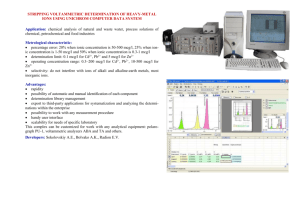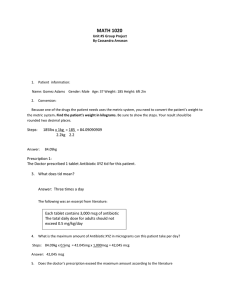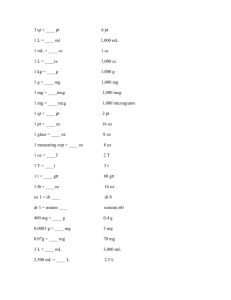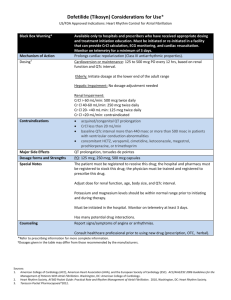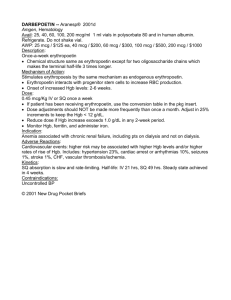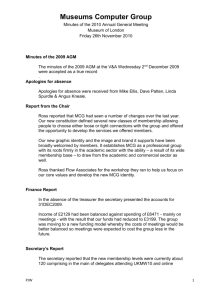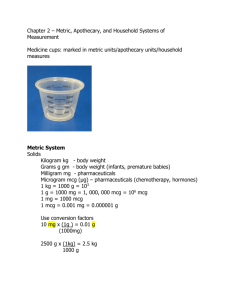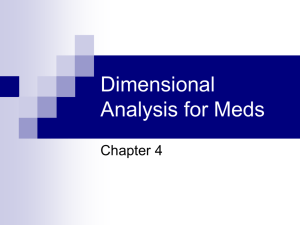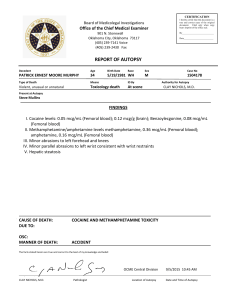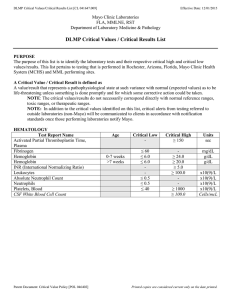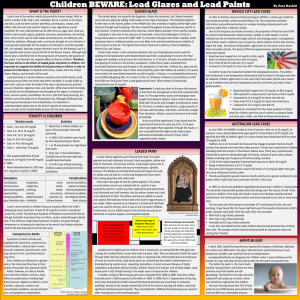PBPPharmCalc1_ISU-1
advertisement
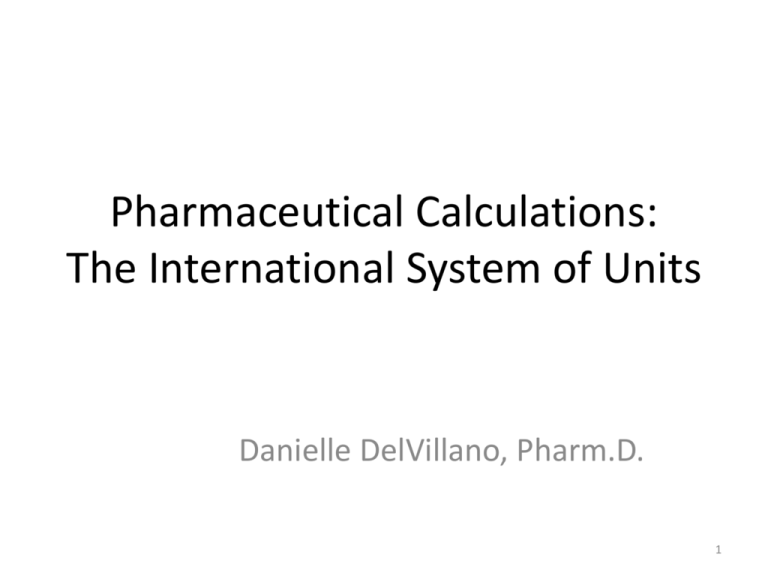
Pharmaceutical Calculations: The International System of Units Danielle DelVillano, Pharm.D. 1 Objectives • Demonstrate an understanding of the International System of Units • Convert measures within the International System of Units • State equivalent measures and complete conversions between the International System of Units and other systems of measure used in pharmacy • Apply the International System of Units correctly in calculations 2 Introduction • International System of Units (SI) – Formerly called metric system – Base units • Meter • Kilogram • Liter http://kaffee.50webs.com/Science/activities/Activity.SI.Unit.Conversions.2.htm 3 Guidelines for Correct Use • Two symbols for microgram – mcg – μg • Decimals are used, not fractions – 5.25 mg – NOT 5 ¼ mg • Leading zero should be used before all decimals – 0.5 mg – NOT .5 mg • Trailing zeros should not be placed after whole numbers – 5 mg – NOT 5.0 mg 4 Common Conversions • Length – 1 m = 100 cm – 100 cm = 1000 mm • Volume • Weight – 1 g = 1000 mg – 1 g = 0.001 kg – 1 mg = 1000 mcg – 1 L = 1000 mL 5 Useful Equivalents Ansel, H. C. (2009) Phamaceutical Calculations (13th Ed.). Philadelphia:Lippincott Williams & 6 Wilkins, and Wolters Kluwer Publishers Practice Problem 1: Reducing SI Units • By decimal shift – Reduce 9876 milligrams to grams • • To convert from smaller to larger number shift the decimal RIGHT 9876 mg = 9.876 g – Reduce 2.525 liters to microliters • • To convert from larger to smaller number shift the decimal LEFT 2.525 L = 2525 mL = 2,525,000 μL 7 Practice Problem 2: Reducing SI Units • Reduce 85 micrometers to centimeters – By ratio and proportion: (KNOW 1 cm = 10000 μm) 1 cm 10000 mcg = x cm 85 mcg (85 mcg)(1 cm) = x cm (10000 mcg) x = 0.0085 cm 8 Practice Problem 2: Reducing SI Units • Reduce 85 micrometers to centimeters – By dimensional analysis: (KNOW 1 cm = 10000 μm) 85 μm X 1 cm__ = 0.0085 cm 10000 μm 9 Practice Problem 3: Addition • Reduce to common denomination then add or subtract • Add 1 kg, 250 mg, and 7.5 g – 1 kg = 1000 g – 250 mg = 0.25 g 1000 g 0.25 g + 7.5 g 1007.75 g 10 Practice Problem 4: Subtraction • Reduce to common denomination then add or subtract • Subtract 2.5 mg from 4.85 g – 2.5 mg = 0.0025 mg - 4.85 g 0.0025 g 4.8475 g 11 Practice Problem 5: Multiplication • Multiply 820 mL by 12.5 and express the result in liters 820 mL x 12.5 _ 10250 mL 10250 mL = 10.25 L 12 Practice Problem 6: Division • Divide 0.465 g by 15 and express the result in milligrams 0.465 g ÷ 15__ 0.031 g 0.031 g = 31 mg 13 Questions 14 Reference • Ansel, H. C. (2009) Phamaceutical Calculations (13th Ed.). Philadelphia:Lippincott Williams & Wilkins, and Wolters Kluwer Publishers 15 Additional Problems 16 Chapter 2 Problem 2 • Add 7.25 L and 875 cL. Reduce the result to mL. 17 Chapter 2 Problem 8 • A liquid contains 0.25 mg of a substance per milliliter. How many grams of the substance will 3.5 L contain? 18 Chapter 2 Problem 13 • Aspirin tablets generally contain 325 mg of aspirin. How many such tablets may be prepared from the 5 kg of aspirin? 19 Chapter 2 Problem 15 • Norgestrel and ethinyl estradiol tablets are available containing 0.5 mg of norgestrel and 50 mcg of ethinyl estradiol. How many grams of each ingredient would be used in making 10,000 tablets? 20 Chapter 2 Problem 20 • A patient is instructed to take three 50 mcg tablets of pergolide mesylate (PERMAX) daily. How many mg of the drug would the patient receive weekly? 21 Chapter 2 Problem 31 • A prefilled syringe contains 20 mg of a drug in 2 mL of solution. How many micrograms of drug would be administered by an injection of 0.5 mL of the solution? 22 Chapter 2 Problem 38 • If an albuterol inhaler contains 18 mg of albuterol, how many inhalation doses can be delivered if each inhalation dose contains 90 mcg? 23 Chapter 2 Problem 49 • The product of biotechnology, filgrastim (NEUPOGEN), is available in vials containing 0.3 mg of drug in each milliliter. Which choice is equivalent in concentration? (a) 0.03 mg/0.1 dL (b) 300 mcg/0.01 dL (c) 3 mcg/0.01 cL (d) 300 mcg/10 cL 24
